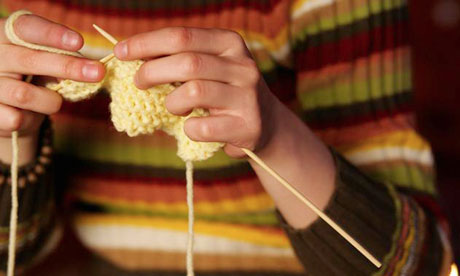Bad shopping habits to hand down to our children
Cheap high-street tat made by exploited workers has replaced lovingly handmade family heirlooms, at great cost to us all
|
|||
|
|
|||
Bad shopping habits to hand down to our childrenBad shopping habits to hand down to our childrenCheap high-street tat made by exploited workers has replaced lovingly handmade family heirlooms, at great cost to us all 
'Dressing a family in handmades demands an investment of time and skill that most people simply couldn’t muster'. Photograph: CorbisLook back through my family's photo albums, and you'll see the faces change as big cousins grow up and little ones appear, but the clothes often stay the same. Party dresses that sparkle again Christmas after Christmas, jeans that have helped to dig holes in many gardens over 10 or 15 years of wear, T-shirts that come to each successive wearer a little more faded but just as loved. And these weren't just shop-bought items, but carefully crafted handmades too: my grandmother is a fine seamstress and knitter, and she turned out scores of fancy cardigans, Aran sweaters and little smocks for me and my sister to wear. When I had my own children, they got their turn to wear the heirloom wardrobe. But with me and my mother being textiles dilettantes at best, only a few new handmades have been added to it. Instead, I head to the high street: a quick binge in H&M for a few fun items, a rummage through Gap when I'm after something a bit nice, one eye on the charity shops to salve the raw edges of my consumer conscience and my credit card statement. Looking at my children's friends, I'm not alone: mass-produced kids' clothes reign, even if the quality of what's on offer means that it doesn't last for very long at all (judging by the scanty rails of tatty things in the thrift shops I go to, anyway). The childrenswear market in the UK is worth an estimated £5bn, according to Mintel, but very little of what we buy is meant to last. Instead, we're heading to the supermarkets to load up on flimsy little garments that often won't even survive the limited use they're put to before just one child grows out of them. Why worry about the quality when you can replace it with something just as cheap and even more fashionable when the season turns? We don't want to spend more than we have to, and we're certainly not going to spend extra so that some child we don't even know can enjoy the benefits. There's something distastefully selfish and short-term about the market for children's clothing. And the drive for producers to make more and make it cheaper can have inhuman consequences. As a recent episode of Dispatches showed on Channel 4, the conditions in which some parts of the textiles industry keep their UK workers can amount to little better than slavery, with lengthy shifts, derisory wages and callous disregard for safety. For the overseas labourers who feed our lust for fashion, the risk can be even worse: yesterday, the Guardian reported on a fire that killed 27 workers in a Bangladeshi factory that supplied clothes to Gap. Is the exploitation of people we don't know an acceptable price for putting fashion at the price point of most families? Well, no – until you get to considering how expensive the alternative is. Dressing a family in handmades demands an investment of time and skill that most people simply couldn't muster. And while fair trade clothing is available, it's inevitably a more expensive option. A brand such as People Tree is well styled, ethically produced – and will put you out of pocket by over 30 quid for a fairly simple T-shirt dress. No wonder the phrase "fair trade" gets taken for a middle-class affectation. Compared with picking up the school uniform next to the frozen foods aisle, it is. Thinking of all the hidden costs, I desperately want to shop more carefully for my children: if sustainability is ever an issue, it should be here. But, like most people, I don't want it quite as desperately as I want to feel I'm getting a fashionable little bargain. It's a hard habit to break, and I worry about what sort of hand-me-down it is to pass to my children.
Sarah Ditum
guardian.co.uk, Wednesday 15 December 2010 16.30 GMT
Original Article
http://none.com |
|||
|